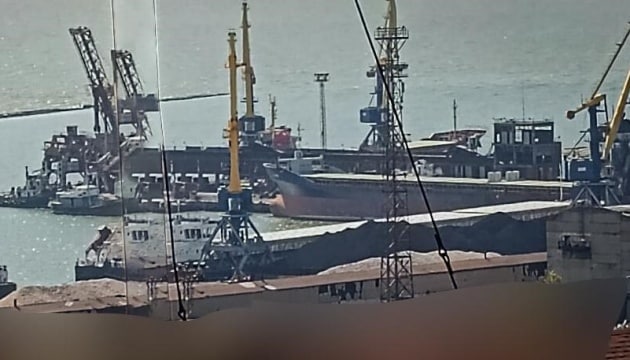Occupiers load ships with stolen Ukrainian grain and coal in Mariupol
Russian Forces Steal Ukrainian Grain in Mariupol

In a troubling development from the temporarily occupied port city of Mariupol, Russian forces are actively loading ships with stolen Ukrainian grain and coal. Petro Andriushchenko, the Head of the Center for the Study of Occupation, shared this information via Telegram, highlighting the ongoing looting efforts in the region. Reports indicate that two vessels are currently being loaded, with one destined for Algeria and the other for Egypt.
Details of the Ongoing Looting
According to Andriushchenko, the loading operations at Mariupol port are being conducted discreetly. One ship is concealed under an elevator, while the other is positioned at the bulk pier, where coal is being loaded. The coal shipment is expected to head to the port of Temryuk before being exported to Algeria, while the bulk carrier filled with grain is slated for Egypt. This activity marks a continuation of the looting that has been prevalent in the region since the onset of the conflict.
Algeria Plans to Revive Shipbuilding as Defense Industry Grows
The Center of National Resistance has reported that Russian occupiers have transformed the theft of Ukrainian grain into a lucrative global enterprise. It is estimated that around 70 countries, including Egypt, Turkey, and Iran, are purchasing what is labeled as “Russian” wheat. This illicit trade not only undermines Ukraine’s agricultural sector but also poses significant challenges to international efforts to address food security in affected regions.
Mariupol’s Role in Russian Military Logistics
The Mariupol seaport has evolved into a critical component of Russian military logistics, serving as a hub for the plundering of resources from occupied territories. The strategic importance of this port has been amplified by its use in facilitating the export of stolen goods, further entrenching the Russian presence in the region. As the situation unfolds, the implications of these actions extend beyond immediate economic losses for Ukraine, potentially affecting global grain markets and international relations.
As the conflict continues, the plight of Ukrainian resources and the ongoing exploitation by occupying forces remain pressing issues. The international community is urged to take notice of these developments and respond accordingly to support Ukraine’s sovereignty and economic stability.
